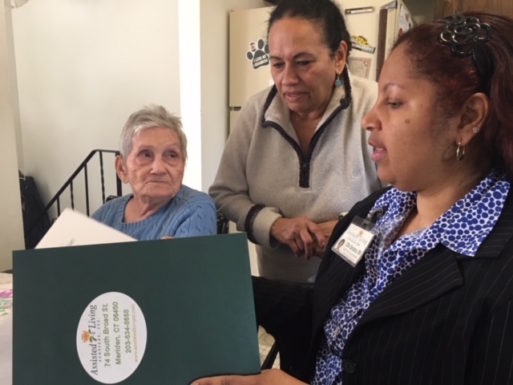According to Caring.com more than 70 million people provide unpaid care for a family member in their home or the patient’s home. This commitment takes enormous time and energy and often adds a financial burden when the family caregiver has cut back on or give up a paying job.

If you are in this situation, Carmen Minchoff may have some good news. You may be eligible to get paid for caring for your elderly relative, depending on where you live.
Carmen lives in Connecticut, and has been taking care of her 90-year-old mother, Maria, for 12 years. As a result of a stroke, Maria’s speech became limited; she could no longer walk; and she suffered constant memory loss.
“I wanted to keep her home with me because I could tell she felt loved, secure, and comfortable here,” says Carmen. “But in order to be there for her I could not work outside my home, so I felt like I was jeopardizing my own family’s finances. That was putting a lot of stress on my husband too.”
After over a decade of caring for Maria unassisted, Carmen sought help. She learned that she was eligible to be a paid caregiver because her mother qualified for the Connecticut Adult Family Living/Foster Caregiver program. Carmen received the required training through Assisted Living Services, Inc., a credentialed local provider of the program.
The program reduces costs associated with home care and institutional care by providing services and home-care devices for the patient. The caregiver may also qualify for a tax-free stipend of over $500 per week, depending on the complexity of care. says Ron D’Aquila, R.N., co-founder and vice president of Assisted Living Services.

From left – Maria Perez and her daughter Carmen Minchoff of Branford listen to care instructions from Olfa Santana-Zephirin RN with Assisted Living Services, ALS is a credentialed provider for a state program that pays relatives to care for elderly family members at home.
Credit: Assisted Living Services
“The financial benefit makes life less stressful for my husband and me and the patient,” says Carmen. The fact that ALS offers Spanish-speaking nurses was a definite plus, as her mother is not bilingual. The program is part of the Department of Social Services’ Connecticut Home Care Services for Elders (CHCPE).
According to the website Paying For Senior Care, eight other states offer similar programs that allow relatives to be paid family caregivers. As of May, 2017, these are Louisiana, Massachusetts, Indiana, Ohio, Oregon, Rhode Island, Texas, and Washington.
Since compensation is involved, all of these states require a formal contract that specifies exactly what care services will be provided. In nearly every program, spouses are excluded from being paid.
Other rules vary by state. Some, like Connecticut, require formal training for the caregivers. Other states require 24/7 availability of a backup caregiver in the home (should the primary caregiver be unavailable).
Depending on the state, there can be legal obligations as well. The host family may be required to establish an adult care home business and be subject to regulation, periodic safety inspections, licensing fees and taxes on the compensation they receive.
Compensation sources and levels also vary from state to state. Families can expect some compensation from Medicaid or a combination of Medicaid and Social Security. Compensation can be for care services only or care services plus room and board, based on a daily or monthly rate. Typically, there is a base rate and an add-on rate for individuals with higher care needs. The website Paying for Senior Care has found compensation rates ranging from a low of $750 per month to a high of $2,500 per month for family caregivers or hosts.

 Are You a Family Caregiver? Some States Will Pay You for Your Time
Are You a Family Caregiver? Some States Will Pay You for Your Time



 “Help Me, Helen”
“Help Me, Helen”















